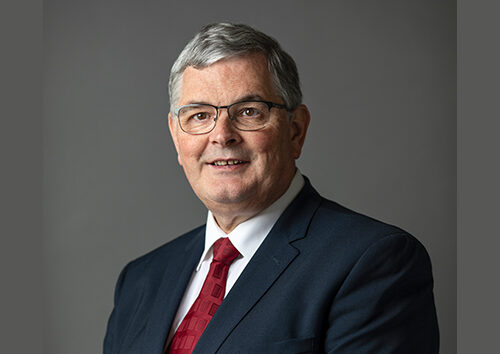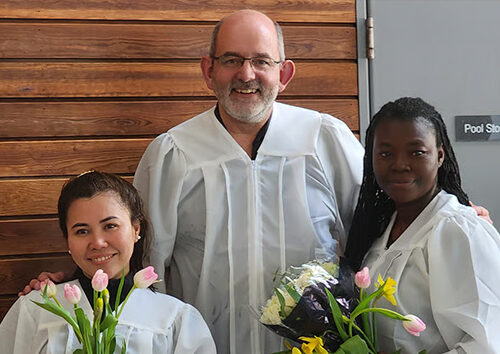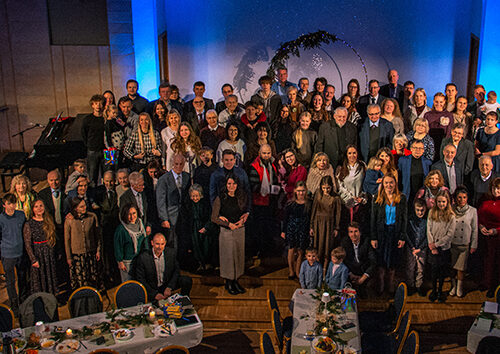13 November 2017 | St Albans, UK [Victor Hulbert] Raafat Kamal is used to thinking outside the box. It is part of president’s job to be visionary. He also needs to stimulate a vision in others. Sometimes that can be challenging and asking him about education is case in point.
I ask him, what is the future of Adventist Education in Europe? He responds, “That we still have schools – that’s a miracle.”
He does not say that lightheartedly. He knows the real commitment of parents, teachers and students across the twenty-two countries that make up the Trans-European Division. He knows the changing demographics, the competition with a very effective and free state educational system, the challenges of affordability and the need for a distinct ‘Adventist advantage’ in what the church must offer – from kindergarten right up to tertiary education.
He also sees the advantages and opportunities. Kamal started church employment teaching religion at an Adventist school in Bergen, Norway, later becoming principal there. “There are three Adventist schools in Bergen. Within the context of a good education they also share Christ and give a biblical view on origins.” He tells how, as a mission school, he saw students being baptised during his time there.
“That kind of story is being repeated across Europe,” Kamal states. Adventists run the only Christian school in Iceland – giving the population of Reykjavik a positive alternative.
 Maruševec Adventist school and college in Croatia not only provides theological training for pastors in the Adriatic Union, but as a high school serves as a real centre of influence for the surrounding community. The school has grown from 126 to 196 students over the past five years – much of that intake coming from the local village where the school has gained significant respect and influence.
Maruševec Adventist school and college in Croatia not only provides theological training for pastors in the Adriatic Union, but as a high school serves as a real centre of influence for the surrounding community. The school has grown from 126 to 196 students over the past five years – much of that intake coming from the local village where the school has gained significant respect and influence.
 The same can be said in very secular Finland where house prices have increased near the Adventist campus in Tampere because people are so keen to get their children into an openly Christian school that is running at capacity. That has revitalised an elderly church congregation with over 100 students regularly attending the Sabbath evening ‘pizza church’, and identifying it as ‘my church’ whether baptised or not.
The same can be said in very secular Finland where house prices have increased near the Adventist campus in Tampere because people are so keen to get their children into an openly Christian school that is running at capacity. That has revitalised an elderly church congregation with over 100 students regularly attending the Sabbath evening ‘pizza church’, and identifying it as ‘my church’ whether baptised or not.
While that kind of story can be repeated at junior colleges and schools in places such as Toivonlinnana in Finland, Vejlefjordskolen in Denmark or Tyrifjord in Norway, other schools have closed or are struggling with intake. That is a serious challenge – both for the individual school and for the future of Adventism in Europe.
TED Education director, Daniel Duda, recognises that challenge. “For many, the day of the boarding school is gone,” he says. “In the past those schools were filled with the children of missionary parents serving overseas. Parents would also send their children from other parts of the country, sacrificing financially to give their children an Adventist education.”
Today the mission field has moved closer to home, the mission territories of yester-year now self-sufficient. At home parents also want to keep their children closer to them in a European culture where boarding schools of any form out increasingly out of fashion, parental values are seen as key, and where (with a few notable exceptions,) private education is seen as an option primarily for those who are failing in the state system rather than as a first choice.
 “We have to take the positive education values we hold dear as a church as implement them within the context of the local situation,” Duda says. “That means strongly supporting the schools we do have, helping them to re-vision themselves if necessary, while using church and church related programmes such as Pathfinders to instil positive Christian values both in our own youth and in their school friends.”
“We have to take the positive education values we hold dear as a church as implement them within the context of the local situation,” Duda says. “That means strongly supporting the schools we do have, helping them to re-vision themselves if necessary, while using church and church related programmes such as Pathfinders to instil positive Christian values both in our own youth and in their school friends.”
For Kamal that may mean a dynamic shift in thinking that encourages bridging links between departments. “Education, youth, Pathfinders and Sabbath school all need to be talking to each other – working together on joint projects,” he says.
That can be seen in the UK where the South England Conference has hosted teen events at Stanborough Secondary school, or in Tampere where after-school activities include pathfinder related skills such as orienteering.
This also places a huge onus on Newbold College of Higher Education to provide a programme for the vast majority of Adventist youth who will never have had opportunity to attend an Adventist School.
“I see Newbold as core to our Education strategy for youth,” Kamal states. He speaks, first of all, from experience.
“Newbold changed me,” he confesses. “I came from a small village with a fixed mindset. Even though I grew up in a loving Adventist home, it is Newbold that gave me the ability to think and reason about my faith and my world-view.” Now a theologian as well as an educator, Duda agrees. “I grew up in a forty-member church within a secularised communist society. While that church shaped my desire to explore my faith further, it is Newbold that radically expanded my vision. It also gave me a multi-ethnic world view – something very important in today’s multi-cultural Europe – and essentially important for mission.”
 Newbold itself has changed in character from the days when Duda and Kamal were students. The Humanities programmes were strong in their day. Now even the best secular universities find them in decline. Changing immigration regulations, student visas and sociological issues have also had an effect, but “Newbold is here to stay – and for good reason,” they emphasise.
Newbold itself has changed in character from the days when Duda and Kamal were students. The Humanities programmes were strong in their day. Now even the best secular universities find them in decline. Changing immigration regulations, student visas and sociological issues have also had an effect, but “Newbold is here to stay – and for good reason,” they emphasise.
“We see Newbold with a two-pronged focus,” Kamal says. “In the first place it will always be a seminary – a place to both educate are future pastors and to provide a balanced theological background for others whose primary career path may be in another direction.”
Beyond that the college now has a refocus in providing a business programme tailored to support the non-profit sector, and a GAP year programme giving youth a basic foundation in the Adventist world-view that will help them face the rigours of developing and defending their faith as they hit either university or the work-place.
This may be a change of emphasis, but is one that Duda is excited about. “Youth, with the strong support of their parents, the local church and the Conference, should be encouraged to spend a year at Newbold.”
Scholarships can help make this an affordable goal. 0.25% of all tithe given across the Division is set aside to support this programme, but the added value, beyond finance, is a generation of youth who can both think through their faith constructively, returning home to be engaged with mission – or at least with the skills to stand up for their faith. Those committing to a degree course can also gain sponsorship.
 “Many, coming from small churches with limited numbers of youth will benefit by gaining an Adventist world-view beyond their local setting, gaining an experience of worship styles, theological diversity, cultural diversity, and simply living in an Adventist environment,” Kamal says. “All we ask in return is that they head home as committed lay-members and a blessing to a local church.”
“Many, coming from small churches with limited numbers of youth will benefit by gaining an Adventist world-view beyond their local setting, gaining an experience of worship styles, theological diversity, cultural diversity, and simply living in an Adventist environment,” Kamal says. “All we ask in return is that they head home as committed lay-members and a blessing to a local church.”
“Every year we see students from Adventist homes who come to Newbold, think through their faith, and then desire baptism before they head home,” Duda notes. “Those youth are going to make a difference wherever they go. Those already baptised still continue their journey exploring their faith, and even the sense of volunteerism that we see developing on the campus bodes well for their future.”
Strategically, both leaders see the following criteria as essential to the Newbold experience:
- Providing a biblical, Seventh-day Adventist, Christ-centred campus life and education
- Exploring intellectual curiosity in a safe environment
- A place for rational enquiry and personal creativity
- An environment that will enhance emotional, creative and spiritual development
- A place to develop social responsibility, equality, diversity and inclusivity
- An education that will develop excellence and achievement
The Newbold experience stretches beyond the confines of the campus. College staff lecture at four other Union based seminaries in Croatia, Hungary, Poland and Serbia as well as providing distance learning options. They are also sought after as presenters at various conferences, spiritual retreats and camps across the TED. That too is part of education.
Beyond that the TED strategically appointed Dr Tihomir Lazić as Public Campus Ministries director. Recently completing his doctorate at Oxford University, and actively involved in student life for many years, Lazić combines this role with that of lecturer in theology at Newbold. “We recognise that most of our Adventist students in Europe will study on a secular campus. This comes with both challenges and opportunities,” Kamal notes. The challenge is the temptation that comes with the student lifestyle, spreading the wings away from home. The opportunity is that in the right environment and with the right coaching, such students can be a beacon of light on their campus.”
 Lazić is working in cooperation with student leaders across the TED to provide resources and coaching. Last year he joined with 45 students in the Netherlands for a weekend on social justice – an item high on the student agenda, then in the summer spent a week with fifty youth from the South-East European Union on a mission project in a run-down village in north-east Serbia. During a week of painting, gardening, renovation and music ministry, he was also able to share positive spiritual principles that helped the youth make positive choices for the future.
Lazić is working in cooperation with student leaders across the TED to provide resources and coaching. Last year he joined with 45 students in the Netherlands for a weekend on social justice – an item high on the student agenda, then in the summer spent a week with fifty youth from the South-East European Union on a mission project in a run-down village in north-east Serbia. During a week of painting, gardening, renovation and music ministry, he was also able to share positive spiritual principles that helped the youth make positive choices for the future.
Žarko Jovanović was one of the participants. “Since I don’t come from an Adventist home, I was thrilled to experience the Christian fellowship that was present among the participants. They constantly sing, and they are happy, and we had a very nice experience. I think that this kind of event should happen more often.”
That is the kind of response that brings joy and hope to Lazić, Duda and Kamal.
So what are these two leaders looking for in terms of education in Europe?
A clear priority is to give Adventist children, youth and adults permission and opportunity to think about and develop their faith in a safe, open environment. This may be a formal educational setting or, for many, in the context of church and church related activities.
They see our schools and junior colleges as an important part of Adventist mission, providing positive, holistic Christian education not just for our own children but as a sphere of influence in the wider community.
They strongly encourage all youth to take time to spend one year at Newbold as a chance to expand their spiritual and academic horizons and prepare them to face the challenges of a secular university or work environment.
They seek enhancement of the student chaplaincy programme encouraging Adventist chapters in all major universities and providing forums and resources for students to develop their faith.
Beyond all, they hold fast to the key aim of positive, Adventist Education:
“The greatest want of the world is the want of men—men who will not be bought or sold, men who in their inmost souls are true and honest, men who do not fear to call sin by its right name, men whose conscience is as true to duty as the needle to the pole, men who will stand for the right though the heavens fall.” [Ellen G White, Education p.57]
“This article first appeared in the Newboldian, Alumni magazine of Newbold College of Higher Education.” [tedNEWS]
tedNEWS Staff: Victor Hulbert, editor; Deana Stojkovic, associate editor
119 St Peter’s Street, St Albans, Herts, AL1 3EY, England
E-mail: [email protected]
Website: www.ted.adventist.org
tedNEWS is an information bulletin issued by the communication department of the Seventh-day Adventist Church in the Trans-European Division.



